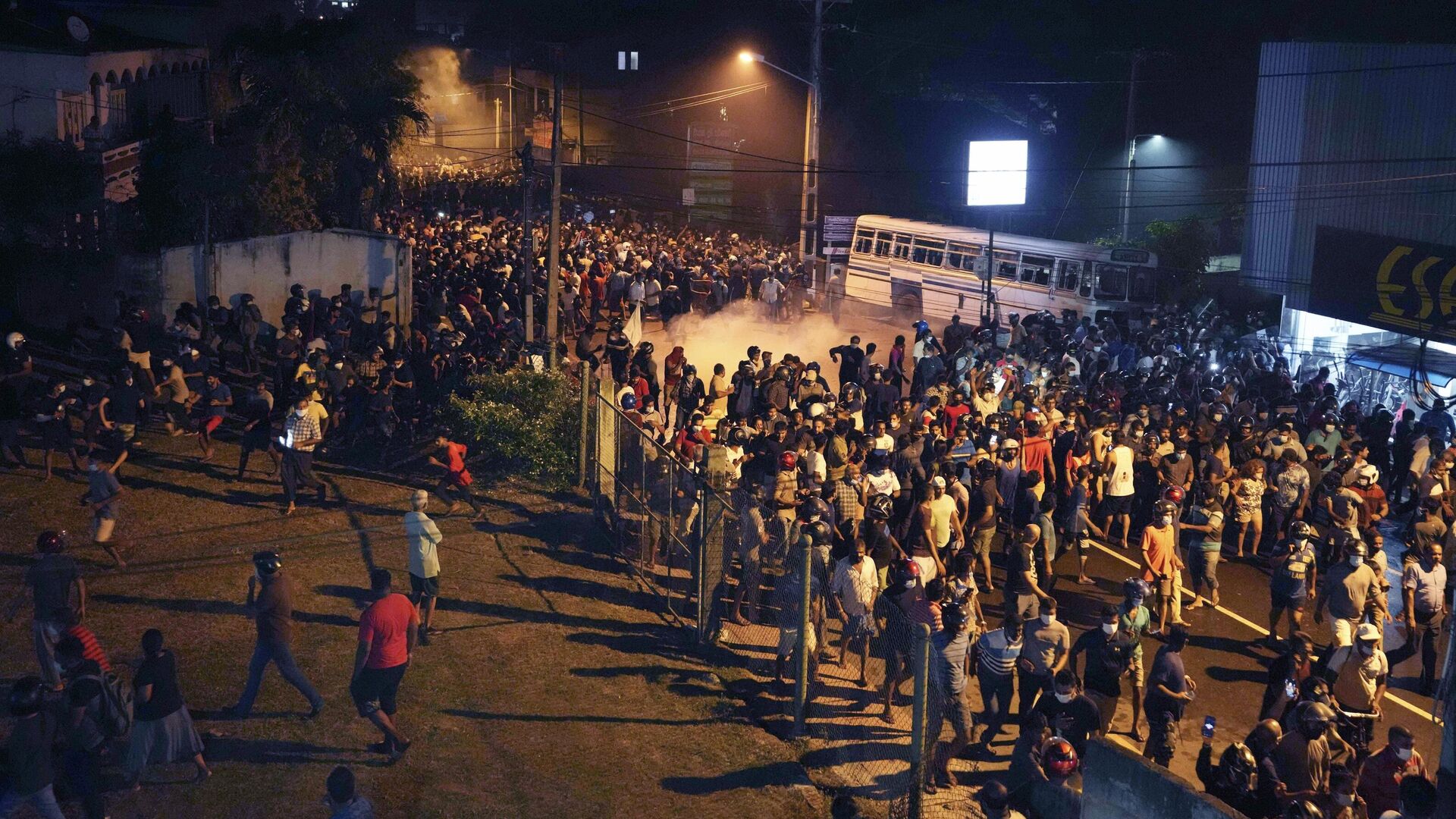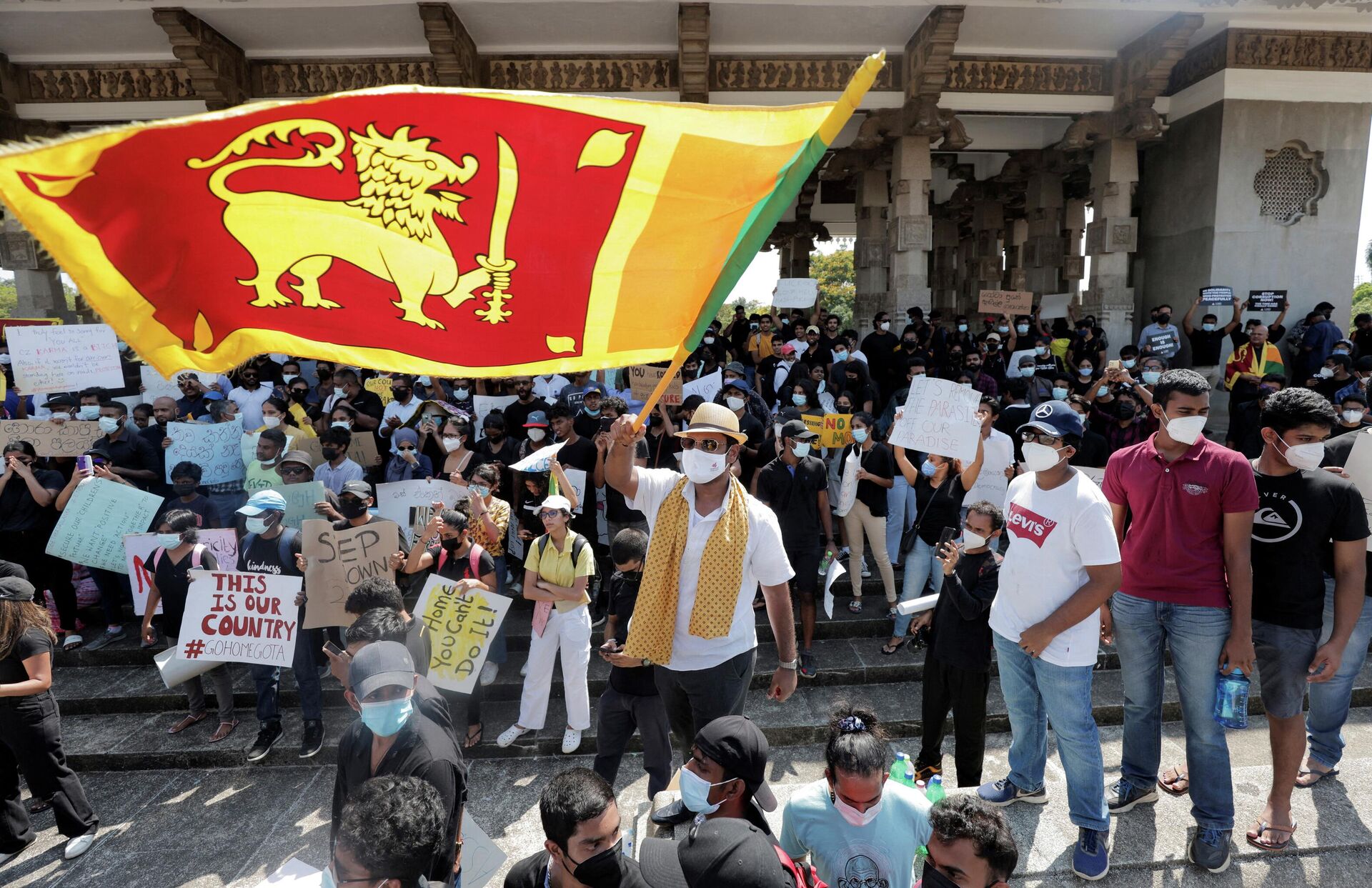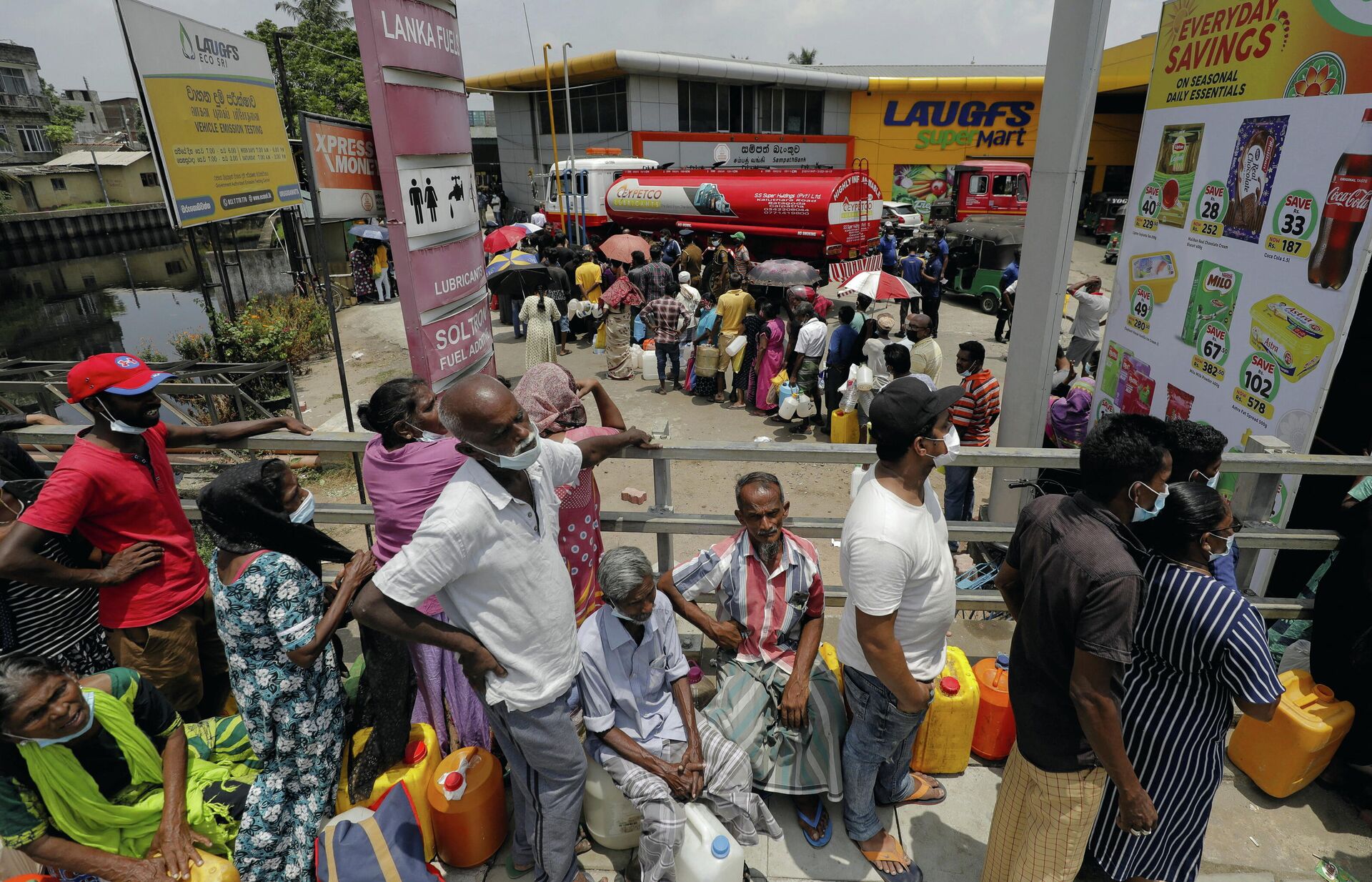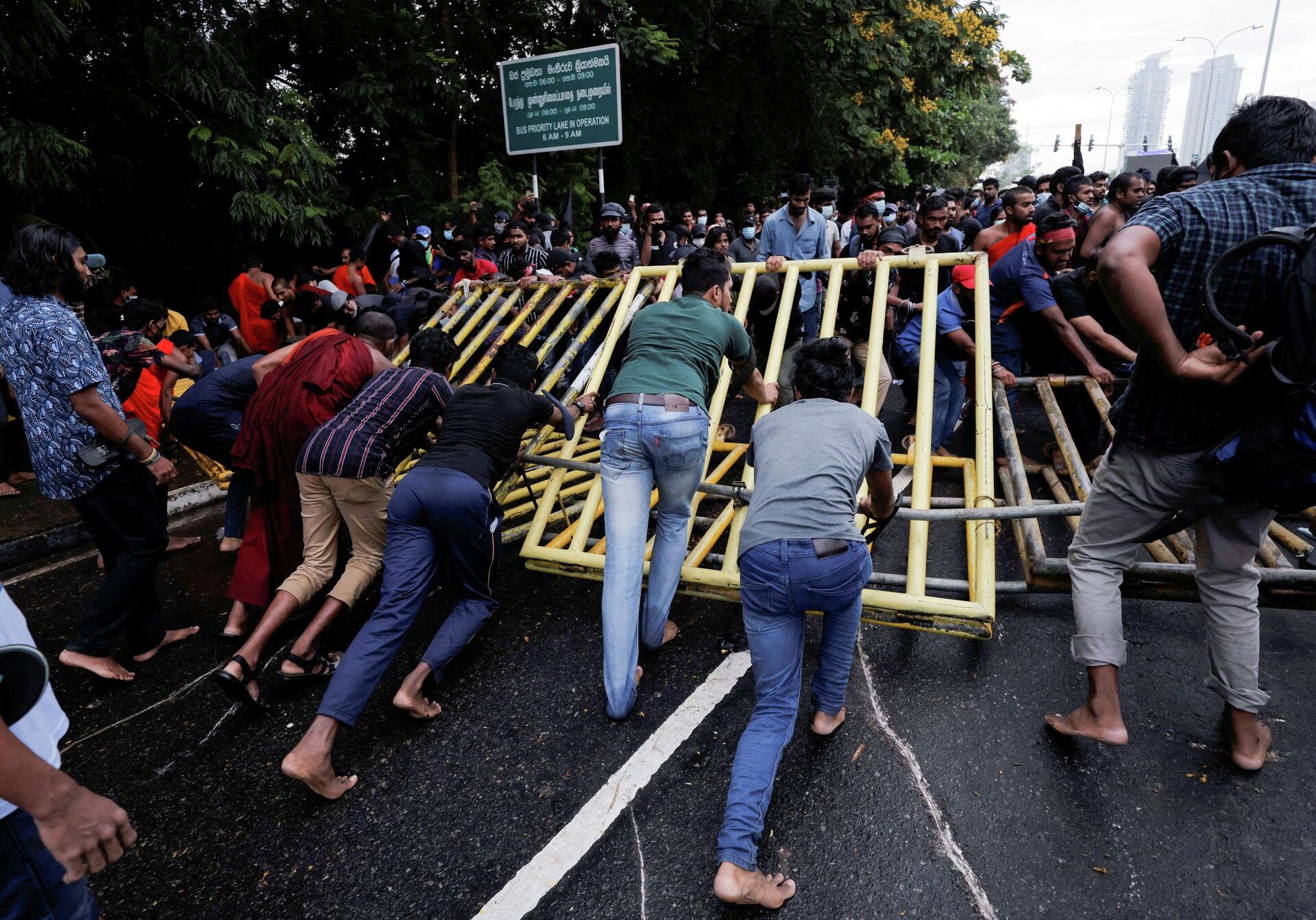Despite Negative Impact on Tourism, Hotel Manager in Sri Lanka Fully Supports Protests

© AP Photo / Eranga Jayawardena
Subscribe
MOSCOW (Sputnik) Tommy Yang - A young hotel manager in southern Sri Lanka shared with Sputnik the impact of the economic crisis and the ongoing protests on the local tourism industry, which just started to recover from a two-year disruption caused by the global COVID-19 pandemic.
Growing up in Mirissa, a popular destination for tourists in southern Sri Lanka, Rusiru Uyanahewa moved to the country’s commercial capital Colombo when he finished his studies at 19 years old to look for a bright future.
During his 10 years in Colombo, Uyanahewa worked at a number of international banks, gave guitar lessons as a private tutor and took a job at a call centre. But the skyrocketing inflation and rising cost of living caused by the debt crisis in Sri Lanka made it more and more difficult for him to stay in the commercial capital.
“I worked as a call centre executive for about six months. And I was not happy with the inflation and there was no point renting out a small house in Colombo. You can't save money, even if you earn about 120,000 in Sri Lankan currency. You can't even save a penny. There was no point of staying there,” Uyanahewa, 29, told Sputnik.
Instead, Uyanahewa decided to move back to his hometown Mirissa last year to stay with his parents, while he tried to apply for jobs in eastern European countries such as Romania.

People shout slogans against Sri Lanka's President Gotabaya Rajapaksa and demand that Rajapaksa family politicians step down, during a protest amid the country's economic crisis, at Independence Square in Colombo, Sri Lanka, April 4, 2022.
© REUTERS / DINUKA LIYANAWATTE
While he was taking Romanian language lessons to prepare for his application, Uyanahewa applied for a position at a local hotel in Mirissa, where foreign tourists finally were able to return after the government lifted COVID-19 related restrictions.
“It [the local tourism industry] didn’t have a good time in the past two years because of the COVID-19 pandemic. The tourism season finally started against in last September or October after two years of the COVID-19 pandemic. We were getting so many foreign tourists, especially from Russia, Belarus and Ukraine. That’s why I applied for this job and got hired at once because I could speak English fluently to communicate with our guests,” Uyanahewa said.
Although he was hired initially as a receptionist in last November, Uyanahewa was promoted to be the general manager of the hotel named Beach & Bliss Mirissa within two months.
Cancellations From Foreign Guests
However, Uyanahewa’s good fortune in the tourism industry was short-lived when the economic crisis in Sri Lanka reached it peak in late March and triggered nationwide protests.
Before the economic crisis hit, the Beach & Bliss Mirissa hotel was fully booked throughout the whole month of April. But rising fuel costs and regular power cuts led to more and more cancellations from foreign tourists.
“In our hotel, we were fully booked until the end of April. But now, we’re getting cancellations and they’re sending us messages through booking.com saying: ’Due to the crisis in Sri Lanka, we’re scared to visit you guys, because you guys don’t have enough petrol or diesel and our plan was to rent a vehicle like a small car or a scooter. But now we can’t do that. And we’re really scared that you guys may not have enough food. We’re really sorry,’” the hotel manager said.
Uyanahewa explained that many foreign tourists coming to Sri Lanka wouldn’t want to just stay in one place like Mirissa for a few days. Most of the foreigners wanted to drive around to experience the different astounding sceneries in various parts of the country.

People stand in a long queue to buy kerosene oil for kerosene cookers amid a shortage of domestic gas due to country's economic crisis, at a fuel station in Colombo, Sri Lanka March 21, 2022.
© REUTERS / DINUKA LIYANAWATTE
“If someone is coming to Sri Lanka, they don’t want to just come to Mirissa, stay for five days and go back to their homeland. People who are coming to Sri Lanka, they mostly stay here for more than a month. Especially if someone is coming from Russia or Ukraine, they seem to want to escape from the winter and they stay for at least two or three months,” he said.
The fuel shortage in Sri Lanka has also triggered continued power outages throughout the country. The regular power cuts became another challenge for hotel operators.
“We don't have diesel [in our country]. And because there's not diesel, we can’t run all the power plants. That’s why we don't have electricity. Every day, we have about like six to ten hours of power cuts. We have on and off power cuts without any advanced notice. If you’re running a hotel, you have to have a generator, because the foreign tourists who come here will always look for rooms with air conditioning as it’s very hot here,” Uyanahewa said.
The backup generator at his hotel is also very important for providing a stable internet connection of its guests.
“The other problem is, even if you don’t have food, you need to have WiFi. The most important thing is to provide a stable WiFi connection. Internet is very important,” the hotel manager said.
Uyanahewa added that his hotel’s backup generator became one of its key attractions because the guests could enjoy air conditioning and WiFi in their rooms without disruptions.
No Travel Insurance
The deep economic crisis and subsequent fuel and food shortages have triggered massive protests, led by the younger generation like Uyanahewa, throughout various regions in Sri Lanka since late March. A large number of protesters continued to camp outside the presidential residence in Colombo, demanding the resignation of President Gotabaya Rajapaksa.
Uyanahewa acknowledge that the unrest was another factor that led to the cancellation from foreign tourists, although he believed the tourists would not face any harm from the protests.

Demonstrators pull down metal barriers as they try to enter the main road towards the parliament during a protest against Sri Lankan President Gotabaya Rajapaksa near the parliament, amid the country's economic crisis in Colombo, Sri Lanka, 8 April, 2022.
© REUTERS / Dinuka Liyanawatte
“Because of that [the protests], the travel agencies and the travel insurance companies think that it’s a risk to travel to Sri Lanka. But it’s not, because tourists coming from outside, you’ll land in the Colombo International Airport and stay there for one night. Then you would be coming down south, because there’s nothing to see in Colombo except for the hot weather,” he said.
The hotel manager argued that most of the cancellations related to the protests were because of the travel insurance companies’ decisions.
“People don’t want to come to Sri Lanka because the travel insurance companies would tell their clients: ’If you go to Sri Lanka without listening to us, we’re not going to give you any insurance coverage.’ Because of that, if something happens to them in Sri Lanka, none of the insurance companies will take care of it. That’s also one of the main problems they’re not coming to Sri Lanka,” he said.
Saving Sri Lanka’s Future
Nevertheless, Uyanahewa pointed out that the economic crisis and the demands from the protesters were much more important issues than the protests’ negative impact on the tourism industry.
“First of all, before thinking about the tourism, we have to think about our motherland. It’s the only country we have as Sri Lankans. We have to think about this first. If the president steps down, maybe 6-12 months after that, we can start doing some proper tourism in Sri Lanka. Otherwise, even if the protesters stop right now, the foreign tourists won’t come here because we still don’t have fuel, electricity and all sorts of other stuff,” he said.
The hotel manager believed the protests were trying to preserve the country’s future.
“If they stop the protests, the people from the government won’t change. If they’re in power for about another 2-3 years, they may end up selling the whole country because they have already sold so many parts of the country to China. They’ll collect the money in their personal accounts and move to the US,” he said.
Uyanahewa plans to travel to Colombo to join the protests himself for at least one day, after he finishes his shift during the New Year’s holidays in Sri Lanka this week.



